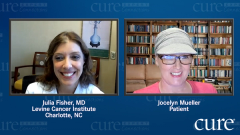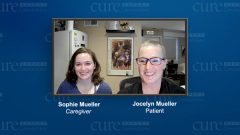
HER2-Positive Breast Cancer: A Caregiver’s Perspective
Sophie Mueller, Jocelyn’s daughter and caregiver, explains her perspectives as a caregiver to Jocelyn and how that impacted her life.
Episodes in this series

Jocelyn Mueller: I'd like to turn things over to [Sophie] and hear from her perspective how she thinks this went as a caregiver.
Sophie Mueller: I'm a senior in high school, so obviously, the pandemic has changed my school experience as well, but 1 of the really nice things about being there for my mom this year is that I had a reduced schedule for this year. I only had 2 classes on campus, so my day was over pretty quickly. I had that freedom to be able to be there for her and be the person who she could ask, "Hey, can you run to Walgreens and pick this up for me?" or "Can you go get this prescription?" or "I'm really craving this food and I think I'll be able to eat it," and I'll go get it. So that freedom of having a shortened school day, and the freedom of being able to drive especially, that was something I feel lifted a big burden off of my parents. Throughout the entire time of her treatment, I was in a marching band.
Jocelyn Mueller: I didn't have to drive her, which was great.
Sophie Mueller: She didn't have to sit in the parking lot waiting for me for hours, but I think what defined my role as a caregiver was just being there for any needs like getting food, prescriptions, and taking care of things in the house, or the dogs, because she really was not up for walking the dogs. I would take that role over for her, and it was just being there and filling the gaps of what she would have normally done around the house, which is a lot. It's a lot.
Jocelyn Mueller: They start to realize how much Mom does when Mom is not doing it, and Sophie was great.
Sophie Mueller: I shaved her head, which was interesting, because I've always had the impulse to see what it would be like. I asked, "Would you like to shave your head?" like shave her own, and held it off, held it off, and then when her hair started falling out, I was like "Can I shave your head?" She wasn't ready for a while, so I was waiting and waiting, and then there was 1 day where I got home from a band practice and she said, "I think I'm ready to do it." I was like, "Okay. Let's get everything ready," and it was hard. It was definitely hard because my mom has always had really long curly dark brown hair. We both have the same curly brown hair, but I was just really glad that I got to be there to help her with that. It's hard because breast cancer takes a lot of your femininity away because it's your breasts that are attacking you. What people perceive as making someone a woman is what's attacking you, and then you also lose your hair, and then you don't look like yourself. 1 of the most random things was that her nails started to get really weak and fragile.
Jocelyn Mueller: And lift.
Sophie Mueller: And lift, and it's just these little things and it takes all the femininity away, which was frustrating to see because she’s my mom, it's hard. But I knew that if I could fill any of the gaps that she needed, I would be able to do that because I had the time and I had the means to do it, so I was willing to help her out.
Jocelyn Mueller: By the same token, my older daughter did not want any part of my head shaving. She broke down and said, "You have always been my mom with your long pretty curly hair," and she said, "I don't want to see this." She was fine with it once we shaved it. You shaved it for me again a couple of weeks after I'd finished treatment; it was just a little scraggly. Some stuff had grown in.
Sophie Mueller: But now we're celebrating that her hair was all messed up yesterday.
Jocelyn Mueller: I have enough hair that it got messed up. For those of you wondering, this is 3 and a half months of growth since chemo stopped. I've heard women say that it's hard to find online resources that show hair growth, and obviously, everybody's growth cycles are different, but this is about 3 and a half months.
Sophie Mueller: It's very exciting to see it all coming back. The post-diagnosis process was hard; it was very hard. I remember learning about her diagnosis, it was just a random morning; she missed the call from her doctor, and we were like, "Oh no, oh no." So, she was just by her phone for a while and then –
Jocelyn Mueller: I called them back and then waited for them to call me back.
Sophie Mueller: I had taken the dogs for a walk, and I got back, and she told me, and then she had to go to work, so it was kind of hard. It was like, "Oh, okay." There was a lot going on with our family at that time also, so it was just kind of –
Jocelyn Mueller: One more thing.
Sophie Mueller: August to early November, the entire period of her treatment, I had a lot going on including all of her stuff, so it was hard. It was hard to see my mom go through this, but I just knew that the best thing that I could do for all of us was just help her out and be there for what she needed. And again, that could be little things like emptying the dishwasher or doing some laundry, or that could be big things like being the one who helps empty her surgical drains or schedule her doctor's appointments.
Jocelyn Mueller: She did a lot of things. She did a lot of that.
Sophie Mueller: There's big and little things that you're gonna have to do as a caregiver, but it's worth it because you know that you're there to help the person that you love. We were all a part of the countdown to Thanksgiving because her last treatment was November 2nd and 3 weeks after that was the week of Thanksgiving, so that would have been her next round of chemo, but there was no more chemo. So, we were thinking "Oh, she'll start to feel better. That's a really good sign," and once we got to Thanksgiving, it wasn't perfect, but it was still like, "We don't have to start this again. She doesn't have to do this again." I was in the local Thanksgiving Day parade that week which –
Jocelyn Mueller: Which we didn't go to because of the pandemic, and because I was immunocompromised.
Sophie Mueller: But it was nice to have that normal thing and not, "Oh, you can't come because of x, y, and z.”
Jocelyn Mueller: That was another piece too was obviously, Sophie was going to school so she was out in the world during the pandemic and she got cold in October and initially, we didn't know whether it was COVID or not. We didn't think it probably was but she had to stay away from me. We didn't go so far as making her quarantine but we really didn't interact much that week until we figured out what was going on and did a test I think.
Sophie Mueller: It was one thing that was nice is that her treatment happened to line up with some days where she could come and see our marching band perform. It kind of worked out that she was feeling normal enough that she could come so there were some little happy moments there where she's got to be normal and be a part of some stuff which was good because it was my last year and it was nice to have my mom there and be a part of it. So concerning her surgery recovery, again like she said, the first surgery was not bad at all. It was basically just a little bit of restrictions on what she could do but it wasn't super limiting. It was kind of a warm-up for her reduction. We were kind of gearing up for her next surgery but helping her with that one, it wasn't too bad but then when the reduction happened, it was a lot. It was a big change for everyone because again, not only that she always have her long hair, her curly long hair, she had very big boobs. My whole life, it was just something that was like "That's my mom.” That's something I always speak but when that reduction happened, it did happen to be something that she'd wanted for a long time just from a comfort standpoint. She wanted the reduction and the lift procedure when she happened to get it unfortunately because she got breast cancer so kind of sped certain things up a bit. On that side, it made me happy because that was something that she had wanted and she got it even after having to go through all of the stuff to get it, she did get something out of it. But it was also hard because I knew that it was hard for her to see her body change in such a dramatic way [00:30:00] and I think that was – Obviously, the physical change was very hard because for about a week there she couldn't do much by herself. But watching her having to watch her body change so dramatically was hard but now, it's another thing we celebrate. It's like "Oh, my god, my back doesn't hurt after a whole day of doing stuff" or you're not having to deal with everything.
Jocelyn Mueller: Again, you celebrate the things that you can and if you look hard enough, there's quite a few things to celebrate and obviously, the further you get through, the more you can celebrate.
Transcript edited for clarity.





